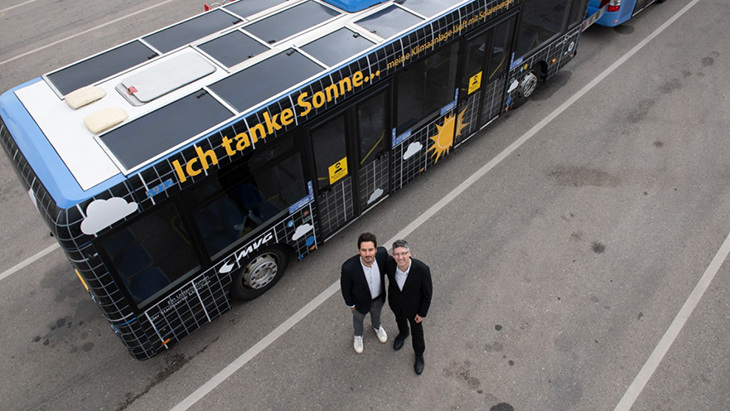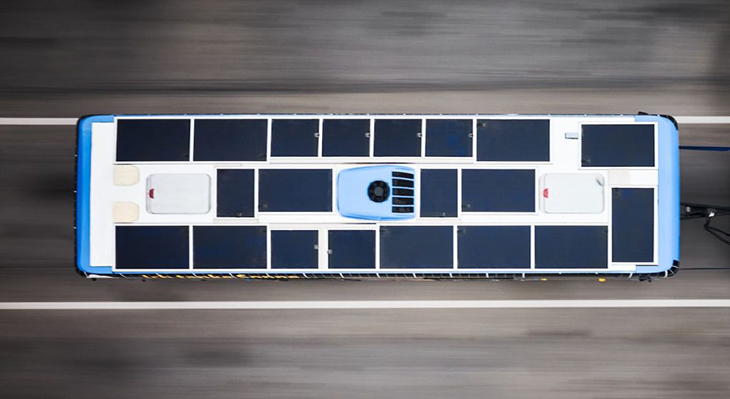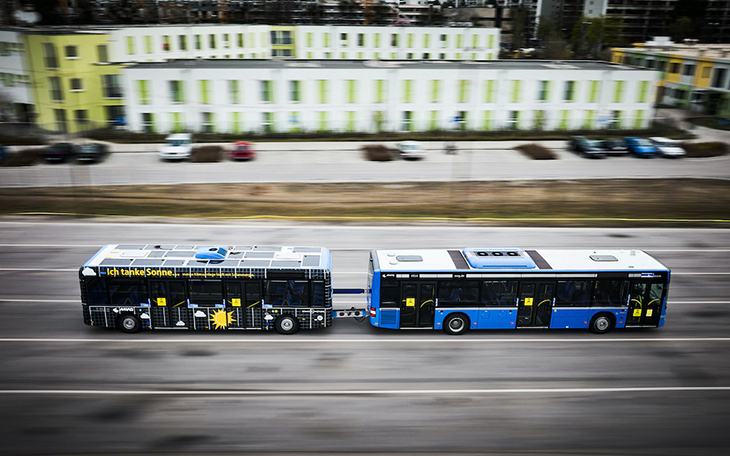
Going solar has loads of benefits, especially when it comes to transportation it would seem. In this particular case, public transportation buses in Munich, Germany have been installed with solar panels, which in turn saves fuel, slashes emissions, and cuts pollution in large proportions.
Back in 2016, three German friends founded Sono Motors, which eventually went public in 2021. They sold their Sion solar-paneled car, which also happens to be a home energy storage system.
But recently, they partnered with Munich Transport Company (MVG) and soon enough, they will release a brand new solar bus trailer that will be on the roads bringing passengers back and forth to where they need to go on their daily operations.
They explain that the Sono Solar Technology will possibly be able to have savings of up to 2,500 liters of diesel each year, per bus, plus a reduction of 6.5 metric tons of local CO2. These bus trailers will also pulled by regular conventional buses, in order to provide more seating capacity on busier routes. These huge trailers are usually powered by diesel fuel.
Sono spokesperson told the publication Good News Network (GNN), “In summer, when the air conditioning is in full use, the trailer consumes more electricity than the towing vehicle can supply.”
On top of the buses roof are 20 photovoltaic modules, which give over 2,000 watts to power the battery of the vehicle, as well as the electrical loads like air conditioning and heating. They will also power the trailer’s steering system.

The spokesperson also shared, “In addition to saving diesel, the additional electricity ensures the stabilization of the battery’s energy supply, thus extending its service life and reducing maintenance costs. Apart from this specific case, Sono Motors Solar Technology can also be integrated into the Bus itself—for supporting the high voltage battery of an electric bus.”
This is also the very first time that Sono’s solar systems are being used on public transportation. As explained by Sono Motors co-founder and CEO, Laurin Hahn, “Especially in times of rising energy prices and increasing urban area emission regulations, our solar technology offers great added value for public transport operators.”
The Technical Considerations
Looking at a medium-sized fleet – which equates to around 300 buses – they found that their calculations show a probability of up to 2,000 metric tons of CO2 per year. As solar cells and power electronics become more efficient in the coming years, these numbers should largely increase.
Moreover, the emissions that are caused during production, which is what the solar solution’s so-called ‘CO2 backpack,’ amounts to ‘a one-off of approximately 1.5 metric tons of CO2 per bus or bus trailer and could be offset after a short runtime of just less than one year,’ they explain.
In collaboration with MVG, their concept for the customized solar bus trailer, more so for use on the buses, was to make sure they would maximize the space and efficiency. And because of the ultra-fast optimization in the millisecond range and the multi-channel system, the yields of PV can even be transferred to the bus battery, and in the best way possible.

The modules, which cover a total area of 130 square-feet or 12 square-meters, also supply the 24 voltage battery with over 2,000 watts of power. Plus the energy that’s generated can be monitored online, all by using their integrated software.
A spokesperson for MVG said, “The question of what energy savings can be achieved by using solar energy are, of course, particularly exciting against the background of current fuel and energy prices.”
Plans to Extend the EV-Bus Ranges
The solar technology of Sono Motors has been patented and developed in order for it to be integrated and licensed into a large range of vehicles. CEO Hahn said, “When e-buses are factory-equipped with our solar technology, additional range can immediately be generated through solar energy on the roof and sides. This not only reduces the standstill times for charging processes, but also protects the battery through a constant charging process. As a result, the e-bus can be operated longer.”
Munich’s vice mayor, Katrin Habenschaden, shared, “I am convinced by the idea, as a lot of fuel can be saved here, and CO2 emissions can be significantly reduced… and this also has a direct impact on air quality.”
In addition, Munich is also working to completely convert their bus fleet into electric drives. By harnessing the power of the sun, it will make the entire process more sustainable, while also furthering the range of their e-buses. Should they prove successful, it could truly be the wave of the future which many other nations will hopefully incorporate in their own cities in the near future.
What are your thoughts? Please comment below and share this news!
True Activist / Report a typo


